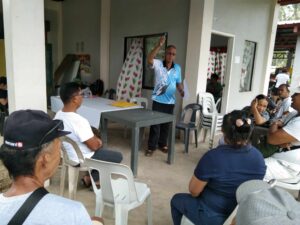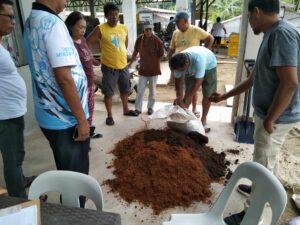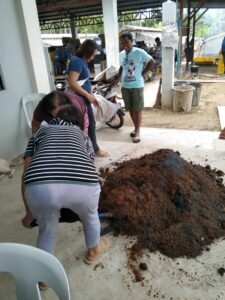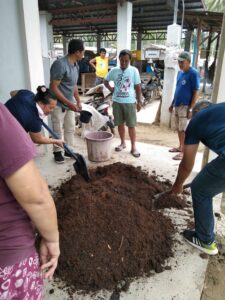 On March 13, 2024, a transformative session on Climate Smart Agriculture (CSA) was conducted at the UNICARBAI MPC (UMPC), benefiting 22 dedicated coconut farmers. This initiative, organized by the Integrated Rural Development Foundation (IRDF), aimed to equip farmers with essential knowledge and skills to combat the adversities posed by climate change.
On March 13, 2024, a transformative session on Climate Smart Agriculture (CSA) was conducted at the UNICARBAI MPC (UMPC), benefiting 22 dedicated coconut farmers. This initiative, organized by the Integrated Rural Development Foundation (IRDF), aimed to equip farmers with essential knowledge and skills to combat the adversities posed by climate change.
The training session commenced by identifying farms with soil deficiencies through meticulous soil sampling. This crucial step allowed farmers to recognize areas with lower soil potency, laying the groundwork for targeted interventions.
The overarching objective of the training was to foster adaptability and resilience among farmers in the face of escalating climate challenges. Participants were not only educated on the detrimental impacts of climate change but were also equipped with practical strategies to mitigate its effects.
overarching objective of the training was to foster adaptability and resilience among farmers in the face of escalating climate challenges. Participants were not only educated on the detrimental impacts of climate change but were also equipped with practical strategies to mitigate its effects.
A pivotal aspect of the training focused on optimizing on-farm resources for organic fertilizer production. Farmers were enlightened on innovative techniques to repurpose agricultural waste such as old husks, cow manure, and chicken dung. By harnessing these resources, farmers can enhance soil fertility sustainably, thereby reducing reliance on costly external inputs while promoting eco-friendly farming practices.
The expertise and guidance provided by seasoned agriculturists from IRDF proved invaluable to the participants. Through interactive sessions and hands-on demonstrations, farmers gained insights into best practices tailored to their specific agricultural contexts. This personalized approach not only facilitated knowledge transfer but also instilled confidence among farmers to implement learned techniques effectively.
Moreover, the training emphasized the importance of holistic farm management strategies encompassing soil health, water management, and crop diversification. By adopting a multi-layered approach, farmers can boost their resilience against climatic uncertainties while ensuring the long-term sustainability of their agricultural endeavors.
In essence, climate-smart agriculture surpasses conventiona l farming paradigms by integrating traditional wisdom with modern innovations. It underscores the imperative of environmental stewardship while simultaneously addressing food security concerns. By embracing CSA principles, farmers can not only mitigate climate risks but also seize opportunities for sustainable growth and prosperity.
l farming paradigms by integrating traditional wisdom with modern innovations. It underscores the imperative of environmental stewardship while simultaneously addressing food security concerns. By embracing CSA principles, farmers can not only mitigate climate risks but also seize opportunities for sustainable growth and prosperity.
In conclusion, the Climate Smart Agriculture training conducted at UMPC signifies a crucial step towards building climate-resilient farming communities. Armed with newfound knowledge and skills, coconut farmers are self-confident in navigating the complexities of a changing climate, ensuring the viability and vitality of agriculture for generations to come.


On March 13, 2024, a transformative session on Climate Smart Agriculture (CSA) was conducted at the UNICARBAI MPC (UMPC), benefiting 22 dedicated coconut farmers. This initiative, organized by the Integrated Rural Development Foundation (IRDF), aimed to equip farmers with essential knowledge and skills to combat the adversities posed by climate change.
 overarching objective of the training was to foster adaptability and resilience among farmers in the face of escalating climate challenges. Participants were not only educated on the detrimental impacts of climate change but were also equipped with practical strategies to mitigate its effects.
overarching objective of the training was to foster adaptability and resilience among farmers in the face of escalating climate challenges. Participants were not only educated on the detrimental impacts of climate change but were also equipped with practical strategies to mitigate its effects. l farming paradigms by integrating traditional wisdom with modern innovations. It underscores the imperative of environmental stewardship while simultaneously addressing food security concerns. By embracing CSA principles, farmers can not only mitigate climate risks but also seize opportunities for sustainable growth and prosperity.
l farming paradigms by integrating traditional wisdom with modern innovations. It underscores the imperative of environmental stewardship while simultaneously addressing food security concerns. By embracing CSA principles, farmers can not only mitigate climate risks but also seize opportunities for sustainable growth and prosperity.





